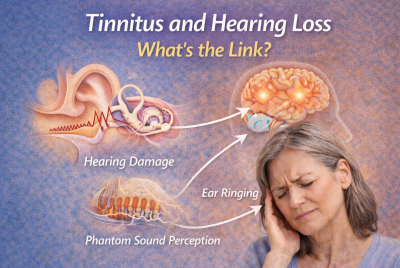Diet and Tinnitus: What Foods Help or Hurt Your Ears
🔊 How What You Eat Affects the Ringing in Your Ears
If you live with tinnitus — the constant ringing, buzzing, or whooshing in your ears — you’ve probably tried just about everything to make it quieter. But one area people often overlook is diet.
Believe it or not, what you eat (and drink) every day can directly affect your ear circulation, nerve sensitivity, and inflammation levels — all key factors that influence tinnitus intensity.
In this article, we’ll explore the connection between diet and tinnitus, identify foods that help or hurt your ears, and share science-backed nutrition tips for long-term hearing support.
🥦 Understanding the Link Between Diet and Tinnitus
While tinnitus has many potential causes — from noise exposure to ear damage — your nutritional habits can either calm or worsen symptoms.
Here’s why:
-
Blood flow: Your inner ear depends on strong circulation. Diets high in salt or sugar can restrict blood flow and increase pressure.
-
Nerve health: Vitamins like B12 and magnesium support nerve function and hearing clarity.
-
Inflammation: Processed foods trigger inflammation, which can worsen tinnitus perception.
According to the American Journal of Otolaryngology, poor nutrition — especially diets high in processed sugar and sodium — may increase tinnitus severity over time.
🧂 Foods That Can Make Tinnitus Worse
Certain foods may not cause tinnitus directly, but they can amplify the ringing or make flare-ups more frequent.
Let’s look at the top offenders.
1. 🧂 Salt: The Silent Aggravator
Salt (sodium) affects blood pressure and inner ear fluid balance. When you eat too much salt, it can raise inner ear pressure, worsening tinnitus or dizziness.
Watch out for:
-
Processed snacks (chips, pretzels)
-
Fast food and takeout
-
Canned soups and frozen meals
-
Delis meats and cheese
Better choices:
✅ Fresh vegetables and herbs for seasoning
✅ Low-sodium alternatives
✅ Drinking plenty of water to flush out excess sodium
💡 Tip: The American Heart Association recommends keeping daily sodium intake below 1,500 mg for optimal ear and heart health.
2. ☕ Caffeine: Friend or Foe?
Caffeine affects people differently. Some notice their tinnitus spikes after coffee, while others find it helps with alertness and mood.
Caffeine sources:
-
Coffee and espresso drinks
-
Energy drinks
-
Black and green tea
-
Chocolate and soda
If you suspect caffeine worsens your tinnitus:
-
Gradually reduce intake (don’t quit cold turkey).
-
Try herbal teas like chamomile or rooibos instead.
-
Stay hydrated throughout the day.
🧘♀️ Note: For some people, small amounts of caffeine actually help manage fatigue and anxiety — both common tinnitus triggers.
3. 🍭 Sugar and Refined Carbs
High-sugar diets can cause spikes in insulin and blood sugar, which affect inner ear blood flow and nerve sensitivity. This can make tinnitus more noticeable.
Common sources:
-
Sodas, candies, and baked goods
-
Sweetened yogurts or breakfast cereals
-
White bread and pasta
Better alternatives:
✅ Choose whole grains and fiber-rich carbs.
✅ Sweeten naturally with fruits like berries or apples.
✅ Avoid “hidden sugars” in condiments or dressings.
4. 🍷 Alcohol and Nicotine
Both alcohol and tobacco affect circulation and oxygen flow to the inner ear. Alcohol dilates blood vessels, sometimes worsening pulsatile tinnitus (a rhythmic thumping sound).
If you drink:
-
Stick to light or moderate intake.
-
Avoid alcohol before bed — it disrupts sleep and can make ringing more noticeable.
Nicotine, on the other hand, constricts blood flow — a major reason tinnitus sufferers who smoke experience louder or more frequent symptoms.
5. 🧀 Highly Processed Foods
Processed foods are loaded with preservatives, sodium, and artificial additives that can trigger inflammation and fluid imbalance in the ears.
Examples include:
-
Fast food and frozen dinners
-
Snack chips
-
Processed meats (bacon, sausages)
-
Flavored crackers and dips
Choose instead: Fresh, whole, home-cooked meals using clean ingredients.
🌿 Foods That Support Hearing and Calm Tinnitus
Now for the good news — certain nutrients can protect your hearing and reduce tinnitus severity.
These are the tinnitus-friendly foods to prioritize.
1. 🐟 Omega-3 Fatty Acids for Circulation and Nerve Health
Omega-3s, found in fatty fish like salmon, mackerel, and sardines, help improve blood flow to the ears and reduce inflammation.
Plant-based sources: flaxseeds, chia seeds, and walnuts.
🧠 Research shows omega-3s can lower age-related hearing loss risk and support overall cardiovascular health.
2. 🍊 Vitamin B12 and Folate for Nerve Repair
Deficiencies in vitamin B12 are strongly linked to tinnitus and hearing loss. These nutrients protect the auditory nerve and help with red blood cell production.
Best sources:
-
Eggs and dairy
-
Fortified cereals
-
Leafy greens and legumes
For vegetarians, a B12 supplement may be beneficial (consult a healthcare provider first).
3. 🌰 Magnesium: The “Anti-Stress” Mineral
Magnesium supports nerve transmission and may protect against noise-induced hearing damage. It also helps relax the body, reducing the stress-tinnitus feedback loop.
Top magnesium foods:
-
Spinach and kale
-
Almonds and cashews
-
Avocados and bananas
4. 🫐 Antioxidant-Rich Fruits and Vegetables
Antioxidants protect ear cells from oxidative stress, a leading contributor to tinnitus.
Eat the rainbow:
-
Blueberries, oranges, and strawberries
-
Broccoli, kale, and carrots
-
Sweet potatoes and bell peppers
Fun fact: U.S. studies suggest people with diets high in antioxidants have better hearing health as they age.
5. 🫖 Herbal Teas and Natural Anti-Inflammatories
Herbal teas like ginkgo biloba, chamomile, and green tea can promote relaxation and circulation.
Best options:
🌿 Ginkgo biloba tea – supports ear blood flow.
🌿 Chamomile tea – reduces stress and improves sleep.
🌿 Ginger tea – lowers inflammation naturally.
6. 💧 Stay Hydrated: Water Matters More Than You Think
Even mild dehydration can affect fluid balance in the inner ear. Drink 6–8 glasses of water daily, and add electrolytes if you exercise regularly.
💡 Quick tip: Replace one soda or coffee each day with water infused with lemon or cucumber.
🍽️ Sample 1-Day Tinnitus-Friendly Meal Plan
Here’s a quick look at what a balanced, ear-friendly day could look like:
Breakfast:
-
Oatmeal with blueberries, chia seeds, and almond butter
-
Herbal tea or warm lemon water
Lunch:
-
Grilled salmon with brown rice and steamed spinach
-
Side of mixed berries
Snack:
-
A handful of walnuts or cashews
-
Chamomile tea
Dinner:
-
Quinoa with roasted vegetables (carrots, peppers, kale)
-
Olive oil drizzle and herbal seasoning
Evening:
-
Magnesium-rich banana smoothie or green tea before bed
🏥 When to See a Doctor
Consult an ENT or audiologist if you notice:
-
Sudden or worsening tinnitus in one ear
-
Ringing accompanied by hearing loss or dizziness
-
Persistent noise despite lifestyle or diet changes
-
Signs of ear infection, blockage, or pain
These could signal underlying conditions like hearing loss, ear infection, or high blood pressure that require professional care.
❓ FAQs About Diet and Tinnitus
1. Can changing my diet really help tinnitus?
Yes — many people report improvement after reducing sodium, sugar, and caffeine while adding magnesium and antioxidants.
2. Are there specific foods that cure tinnitus?
There’s no “cure,” but a nutrient-rich, anti-inflammatory diet can ease symptoms and support hearing health.
3. Does caffeine always make tinnitus worse?
Not for everyone. Some tolerate moderate caffeine without issues, while others notice flare-ups. Track your response.
4. Can dehydration cause ringing in the ears?
Yes — dehydration can affect inner ear fluid balance, making tinnitus more noticeable.
5. What vitamins help with tinnitus?
Vitamin B12, magnesium, and zinc are the most researched nutrients for auditory support.
6. Should I avoid alcohol completely?
Moderation is key. Occasional light drinking is fine, but heavy intake may worsen tinnitus.
7. How long before diet changes improve tinnitus?
Most people notice improvement within 4–6 weeks of consistent healthy eating and hydration.
🌟 Conclusion: Eat Smart, Hear Better
Your diet plays a far greater role in ear health than most people realize. By reducing salt, sugar, and caffeine while prioritizing nutrient-rich whole foods, you can improve circulation, nerve function, and overall wellness.
Remember — progress takes time. With patience, consistency, and mindful nutrition, you can create a lifestyle that supports your hearing and helps you find more quiet moments in your day.
⚠️ Disclaimer
This article is for educational purposes only and does not substitute for medical advice. Always consult a qualified healthcare provider before making dietary or supplement changes for tinnitus or related conditions.







